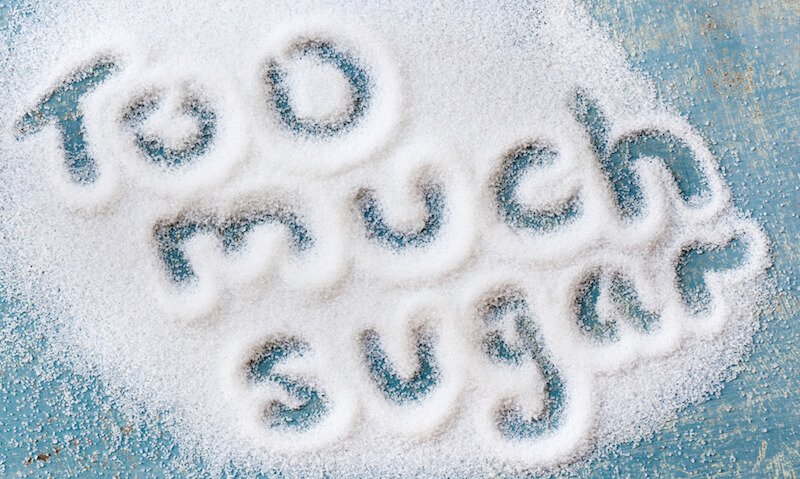Maybe you’ve always known that too much sugar is bad. But modern research has shown that ‘bad’ doesn’t even cover it. Refind sugar is the modern-day poison, the culprit behind a host of conditions, and the greatest threat to human health.
The recommended daily sugar intake is no more than 9 teaspoons for men and 6 teaspoons for women. The average American consumes a whopping 19.5 teaspoons a day. That’s about 66 pounds of added sugar every year and three times the amount our bodies deem healthy.
What does this mean? For one, people are putting themselves at risk of various diseases – or worse, death.
Two, some experts have good reason to believe that we could truly be addicted to refined sugar. After all, the sweet habit is contributing to an epidemic that’s getting out of control.
So before you cut yourself another slice of that pecan pie, take heart.
The Not-So-Sweet Truth Behind Refined Sugar
There is now a growing consensus among experts that sugar is bad, bar none. This is due to growing evidence that refined sugar is the perpetrator of today’s most feared health conditions, including heart disease. And that’s not all.
A Serious Threat to the Heart
A sugar-laden diet increases your risk of dying from heart disease, regardless of your weight.
In a study published by JAMA Internal Medicine, scientists found that participants whose diets included 25% or more added sugar were more than twice as likely to die from heart disease as those who took in less than 10% added sugar.
The higher the percentage of refined sugar in the diet, the higher the odds of death by heart disease. And this is true irrespective of weight, age, sex, and physical fitness.
The researchers also found that no matter how healthy the participants’ diets are, and how well they comply with the federal dietary guidelines, those who consumed more refined sugar still face a higher risk of dying from cardiovascular disease.
How excess sugar intake harms the heart isn’t well established. One finding reveals that consuming sugary drinks can raise blood pressure, while a sugar-rich diet may stimulate the liver to throw more bad fats into the bloodstream. High blood pressure and fats in the bloodstream are both known to jack up the risk of heart disease.
“A Weapon of Mass Destruction” on the Liver
What do alcohol and sugar have in common? They’re both bad for your liver. Non-alcoholic fatty liver disease (NAFLD) is on the rise, and sugar is mostly to blame. Specifically, sugar in the form of high-fructose corn syrup found in drinks and processed foods.
According to findings, people who consume at least one drink that contains added sugars is more likely to develop to NAFLD than those who avoid sugar-sweetened beverages.
NAFLD affects about 17% to 33% of Americans, a rising problem that rivals the prevalence of type 2 diabetes, obesity, metabolic syndrome, and insulin resistance.
The take-away? Steering clear of added sugar consumption lowers the odds of having NAFLD.
Higher Risk of Type 2 Diabetes
For every 150 calories of sugar a person takes in a day, the risk of developing type 2 diabetes increases by 1.1%. The heightened risk is true regardless of the types of food that people eat, physical activity, and alcohol use.
Risk of type 2 diabetes increases especially when people are consuming high levels of animal fat, while also consuming refined sugar. The effect that fat has on our cells prevents insulin from reaching those cells, and instead, raises blood sugar levels.
Link to Tumour Growth and Cancer
Even with an absence of a cause-and-effect relationship, several studies have identified a link between sugar and some cancers.
- Added sugars heighten the risk of esophageal cancer
- Added fructose, specifically high-fructose corn syrup contribute to the risk of cancer in the small intestine
- High intake of added sugars increases the risk of colon cancer (adjusted for factors like obesity and diabetes)
- Refined sugar can contribute to the development of breast cancer tumours and metastasis to the lungs
The Stealthy Sugar
The biggest sources of added sugar are by far the sodas, energy drinks, and sports drinks guzzled by Americans every day. They make up more than one-third of the added sugar we consume as a nation. There are about 9 teaspoons of sugar in one 12-ounce can of soda, so drinking even just one a day would put you over your daily limit.
Sweet treats like candy, cakes, pastries, cookies, and jams are just as dangerous. After all, sugar is one of the main components of marmalades and jams.
While these are obvious junk foods, a great portion of the sugar people consume is a bit stealthier. It lurks in less obvious places, processed foods like bread, meat, salad dressings, ketchup, and even low-fat yogurt. Of the 600,000 of food items sold in America, about 80% contain added sugar.
Limiting Sugar Consumption
To manage your sugar intake, experts recommend the following:
Don’ts
- Consume refined carbs, like cereals, bagels, waffles, etc.
- Binge on sweets like cookies, cakes, pies, and anything else that combines high sugar with high fat – this wreaks havoc on our blood sugar levels.
- Swap corn syrup with artificial sweeteners like sucralose and aspartame.
Do’s
- Drink water, and nothing else.
- Eat healthy fats, such as omega-3, which can be found in chia seeds, hemp seeds, flaxseed, virgin olive oil, raw nuts, etc.
- Introduce fermented foods to your diet, such as kimchi, kombucha, and fermented vegetables. The bacteria found in these foods can support digestion and detoxification, helping lessen the fructose burden on your liver.
Conclusion
It’s shocking to learn that one of mankind’s deadliest concoctions can be found in our cupboards and our favorite treats.
Yes, sugar is appetizing, irresistible, and satisfying. And more accurately, it’s addictive, toxic, and deadly. Calling sugar a slow modern-day poison is not too far a stretch. But what’s even scarier, is how mindlessly we’ve poisoned ourselves all these years.
Experts strongly advise to seek the “antidote”, and it can be as simple as forgoing that last slice of pecan pie.









Leave a Reply